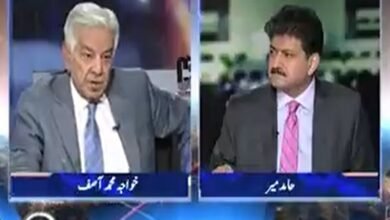PECA case: IHC stops FIA from detaining people
The IHC has stopped FIA from detaining people after conducting the first hearing on a petition challenging the PECA amendment ordinance.

ISLAMABAD: The Islamabad High Court (IHC) has stopped the Federal Investigation Agency (FIA) from detaining people after conducting the first hearing on a petition challenging the Prevention of Electronic Crimes Act (PECA) amendment ordinance.
The Chief Justice of the Islamabad High Court (IHC) Justice Athar Minallah heard the petition filed by the Pakistan Federal Union of Journalists (PFUJ) against the Prevention of Electronic Crimes (Amendment) Act Ordinance 2022.
The intelligence agency has been stopped from arresting people under PECA’s Section 20 by the IHC besides ordering the Attorney General of Pakistan to assist the court in the case.
The IHC CJ Justice Athar Minallah remarked that the FIA had already submitted its standard operating procedures (SOPs). He ordered FIA not to make arrests on any complaint under PECA’s Section 20 in accordance with the SOPs.
The judge warned action against FIA director-general (DG) and interior secretary if SOPs are not implemented. He maintained that there should be no law against the defamation of the public office-bearers. The IHC CJ added that the defamation legislation was even removed from the criminal justice system in Zimbabwe and Uganda.
Syed Talat Hussain: PML-N spox’s ‘explosive’ statement to see consequences
Later, the high court adjourned the hearing till Thursday (tomorrow).
The Pakistan Federal Union of Journalists (PFUJ) had filed a petition against the Prevention of Electronic Crimes (Amendment) Act Ordinance 2022 on February 22. The petition stated that the amendments in the PECA 2016 promulgated by President Dr Arif Alvi showed the ill-will of the government as the conditions were not met.
PECA promulgation
President Arif Alvi had promulgated two ordinances on Sunday that would bring changes in the Prevention of Electronic Crimes Act, (PECA) 2016, and the Elections Act, 2017.
Both laws were signed by the president after the Cabinet approved them. The changes made in the electronic crimes act have been made under the Prevention of Electronic Crimes (Amendment) Ordinance, 2022.
Under the ordinance, the definition of a “person” has been broadened to include any company, association, institution, organisation, authority, or any other. Furthermore, anyone found guilty of attacking a person’s “identity” will now be sentenced to five years instead of three years.
Sabir Hashmi faces action under PECA passed by PML-N govt
The ordinance also states the informant or the complainant shall be “aggrieved person, his authorised representative, or his guardian, where such person is a minor or a member of the public in respect of a public figure or a holder of public office”.
Cases falling under PECA will be supervised by a high court and the trial court will have to conclude the case within six months, the state news agency reported.
“The court shall submit a monthly progress report of any pending trial to the concerned high court and shall give reasons for the inability of the court to expeditiously conclude the trial,” says the ordinance.
Apart from sending the report to the high courts, copies of the progress report will be sent to the law secretary if the case is registered in the Islamabad Capital Territory. However, if a case is registered in a province, then the copies of the report will be submitted to the “provincial secretaries of prosecution departments, the prosecutor general or advocate general”.
PECA effects: Javed Chaudhry disclaims content on website, social media page
The ordinance also authorises the high court to issue “fresh timelines” of a case if it finds the “reasons” given by the trial court “plausible” and beyond its control. The ordinance also empowers the high courts to summon federal or provincial government officers to remove any “difficulties, hindrances and obstacles” it finds in the case.
If the law secretaries find that the case was delayed due to the “presiding officer or any of its functionaries” then they may inform the high court. If the high court is of the view that the delay in the disposal of a trial is attributable to the presiding officer of the court or any other court functionary then they can initiate or “direct commencement of appropriate disciplinary proceedings.”
The ordinance also empowers the chief justice of every high court to nominate a judge along with other officers.




